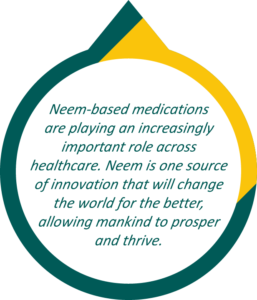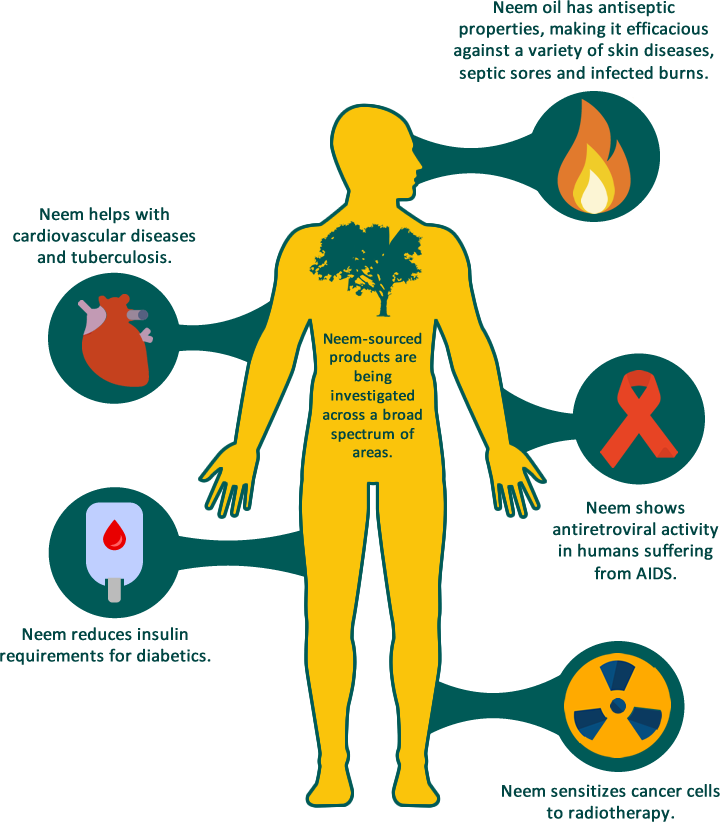Neem (Azadirachta Indica) is an ancient medicinal tree that has been celebrated for its remarkable healing properties as far back as 5,000 BCE. Described in traditional Indian Ayurvedic texts as Sarva roga nivarini, the universal healer of all ailments, and Nimba, giver of good health, neem’s name is Arista in Sanskrit, meaning ‘perfect, complete and imperishable’. For thousands of years, the neem tree has been used to treat deadly diseases and safeguard personal health.
Fast-forward to present day and all parts of the neem tree are utilized for a wide range of medicinal conditions due to its antimalarial, antifungal, antibacterial, antiviral and antioxidant properties. With over 200 compounds proven to be effective against inflammation, infection, fever, skin disease and dental illness, neem is a solution to a variety of ailments. Renowned institutions such as the Mayo Clinic, Oxford University, the Massachusetts Institute of Technology and the National University of Singapore are currently investigating the extensive health benefits that neem offers.
New peer-reviewed scientific research investigations are determining neem’s ability to treat a range of conditions from psoriasis to managing skin damage during chemo-radiation and evaluating the plant’s effectiveness as a cure for influenza.
One of the latest scientific investigations into the medicinal benefits of neem shows that hyperoside, a compound exclusive to the neem tree, can disable the influenza virus from replicating and causing infections. Published in BioMed Central’s Complementary and Alternative Medicine Journal, this study designed, screened and tested the universal treatment. Such a solution could be used to save the 56,000 people who die and the several hundred thousand people who are hospitalized every year from influenza epidemics around the world. The flu virus inflects people extremely easily and epidemics are an annual occurrence. Vaccines currently available on the market can stimulate the body’s immune response, but developing effective protection has been extremely problematic due to the virus’ ability to mutate easily from one year to the next. This makes developing a vaccine for the flu season a game of prediction; predicting which strain of the virus will be the most predominate. Neem’s hyperoside solves this problem by disabling a critical part of the virus that does not adapt over time – the viral protein nucleoprotein. This nucleoprotein remains the same in 89% of influenza strains and has a main role in its life cycle. Once damaged, the virus becomes unable to duplicate and create an infection. Hundreds of flu vaccine compositions were analyzed in this study and the hyperoside was widely considered the most effective.
Neem is famously renowned for treating a variety of chronic skin conditions such as acne, ringworm and eczema. After significant research, neem is now being celebrated as one of the most effective biologic treatments for psoriasis, a condition that disables 125 million people around the world today. The World Health Organization described psoriasis as a chronic, non-communicable, painful, disfiguring and disabling disease that has a great negative impact on quality of life. Researchers from the Robert Larner College of Medicine at the University of Vermont, The Warren Alpert Medical School of Brown University and the University of California at Davis found that neem was one the most efficacious botanical agent tested for psoriasis treatment.
Neem oil has also proved to be a safe and effective option in the management of acute skin toxicity in cancer patients submitted to chemo-radiation. Acute skin toxicity is a frequent skin condition occurring during combined radiotherapy and chemotherapy. The timely and appropriate management is crucial for both oncological results and patient’s global quality of life.
Alongside medicinal benefits, there is a significant financial opportunity in the production of such life-saving treatments. $3.5 billion was spent on influenza vaccines in 2015 and the market is set to be worth $4.3 billion by 2025. The global market for psoriasis treatments is expected to more than double from $6.6 billion in 2014 to over $13.3 billion by 2024. For cancer treatments, the market reached $107 billion in 2015 and is expected to reach $150 billion by 2020.
A tree with multiple beneficial properties, neem-based medications are playing an increasingly important role across healthcare. Neem sourced products are being investigated across a broad spectrum of areas, including cardiovascular disease and tuberculosis, while the oil has antiseptic properties, making it efficacious against a variety of skin diseases, septic sores and infected burns. Over the years, the scientific community has even discovered that neem reduces insulin requirement for diabetics, shows antiretroviral activity in humans suffering from AIDS and sensitizes cancer cells to radiotherapy.
We have the profound opportunity to develop solutions to many of mankind’s most significant challenges by using the compounds found in nature. Neem is one such source of innovation that will change the world for the better, allowing mankind to prosper and thrive.

